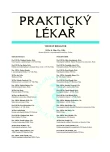-
Medical journals
- Career
Post-traumatic stress disorder in abused children
Authors: Z. Toužimská
Authors‘ workplace: Primář: MUDr. Jana Šplíchalová ; Oddělení dětské psychiatrie Fakultní Thomayerovy nemocnice, Praha
Published in: Prakt. Lék. 2009; 89(2): 65-70
Category: Various Specialization
Overview
Post-traumatic stress disorder (PTSD) is a relatively frequent diagnosis in traumatized child patients of younger developmental stages, who are treated at the Child Psychiatry Department of Thomayer´s University Hospital in Prague. However the symptomatic picture is not always complete as in the adult population. PTSD is often combined with dissociative, as well as with depressive disorders, which are further after-effects of child abuse (particularly long-term abuse). The cases of patients described here illustrate factors influencing the onset of PTSD and its course in abused children.
Key words:
CAN (child abuse and neglect), psychiatric hospitalization, post-traumatic stress disorder.
Sources
1. Ackermann, P.T., Newton, J.E.O., McPherson, W.B., et al. Prevalence of post-traumatic stress disorder and other psychiatric diagnoses in three groups of abused children (sexual, physical and both). Child Abuse and Neglect 1998, 22(8), p. 759-774.
2. Almquist, K., Brandell-Forsberg, M. Refugee children in Sweden: Post-traumatic stress disorder in Iranian preschool children, exposed to organized violence. Child Abuse and Neglect 1997, 21(4), p. 351-366.
3. Duncan, R.D., Saunders, B.E., Kilpatrick, D.G. et al. Child physical assault as a risk factor for PTSD, depression and substance abuse: findings from a national survey. Am. J. Orthopsychiatry 1996, 66(3), p. 437-448.
4. Pemová, T. Formy zanedbávání u hospitalizovaných dětských psychiatrických pacientů. Bakalářská práce. Praha: Fakulta sociálních věd UK, 2000.
5. Finkelhor, D. The victimization of children: a developmental perspective. Am. J. Orthopsychiat. 1995, 65(2), p. 177-193.
6. Friedrich, W.N. Psychotherapy of sexually abused children and their families. New York, London: W. W. Bortin and Co., 1990.
7. Morris, P.A. Superkids: short-term therapy for children with abusive backgrounds. JCAPN 1994, 7(1), p. 25-31.
8. Sourander, A. Behavior problems and traumatic events of unaccompanied refugee minors. Child Abuse and Neglect 1998, 22(7), p. 719-727.
9. Schaaf, K.K., McCanne, T.R. Relationship in childhood sexual, physical and combined sexual and physical abuse to adult victimization and posttraumatic stress disorder. Child Abuse and Neglect 1998, 22(11), p. 1119-1133.
10. Vinař, O., Poraněná duše, aneb posttraumatická stresová porucha. Lékařské Listy, 20/2007, s. 10-14.
11. Salomon, S.D., Gerrity E.T., Muff A.M. Efficacy of treatments for posttraumatic stress disorder. JAMA 1992, 268(5), p. 633-638.
12. Diagnostic and Statistical Manual of Mental Disorders, DSM IV. American Psychiatric Association. Fourth Edition,1999.
13. Friedrich, W.N. Psychotherapy of sexually abused children and their families. New York: W. W. Norton comp by the Mayo Foundation, 1990.
14. Friedrich, W.N. Psychotherapy with Sexually Abused Boys; an integrated approach. Thousand Oaks, CA: Sage Publications, 1995. 249 p.
15. Cohen, J.A., Deblinger, E., Mannarino A.P., Steer R.A. A multisite, randomized controlled trial for children with sexual abuse–related PTSD symptoms. J. Am. Acad. Child Adolesc. Psychiatry 2004; 43(4), p. 393–402.
Labels
General practitioner for children and adolescents General practitioner for adults
Article was published inGeneral Practitioner

2009 Issue 2-
All articles in this issue
- Post-traumatic stress disorder in abused children
- Smoking and cardiovascular diseases
- The role of reduction mammaplasty in breast hypertrophy
- Prevention of tick-borne encephalitis from the point of view of a health insurance company
- Hand transplantation
- Neurostimulation for the treatment of refractory angina pectoris
- Pathophysiology of diabetic retinopathy
- Allergic rhinitis as an occupational disease
- Patient satisfaction with provided care: theoretic approaches and models
- General Practitioner
- Journal archive
- Current issue
- Online only
- About the journal
Most read in this issue- Hand transplantation
- Post-traumatic stress disorder in abused children
- Allergic rhinitis as an occupational disease
- Patient satisfaction with provided care: theoretic approaches and models
Login#ADS_BOTTOM_SCRIPTS#Forgotten passwordEnter the email address that you registered with. We will send you instructions on how to set a new password.
- Career

